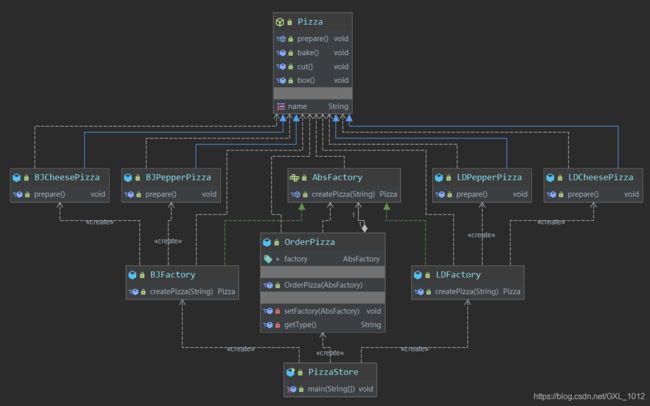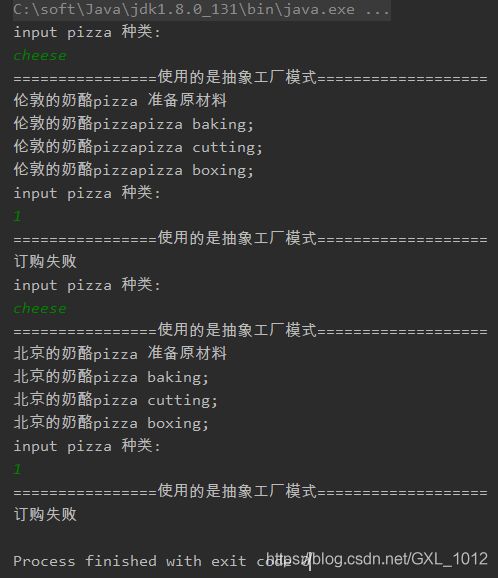Java设计模式——工厂模式(抽象工厂模式实例)
1、基本介绍
- 其定义了一个interface用于创建相关或有依赖关系的对象簇,而无需指明具体的类
- 抽象工厂模式可以将简单工厂模式和工厂方法模式进行整合
- 从设计层面看,抽象工厂模式就是对简单工厂模式的改进(或称为进一步的抽象)
- 将工厂抽象成两层,AbsFactory(抽象工厂)和具体实现的工厂子类。可以根据创建对象类型使用对应的工厂子类。这样将单个的简单工厂类变成了工厂簇,更有利于代码的维护和扩展
2、UML类图
3、应用实例
Pizza
package com.weirdo.factory.absfactory.pizzastore.pizza;
/**
* 抽象Pizza类
*/
public abstract class Pizza {
protected String name;
/**
* 准备材料,不同披萨需要准备的材料不同,因此做成抽象
*/
public abstract void prepare();
/**
* 烘烤
*/
public void bake() {
System.out.println(name + " baking;");
}
/**
* 切
*/
public void cut() {
System.out.println(name + " cutting;");
}
/**
* 打包
*/
public void box() {
System.out.println(name + " boxing;");
}
public void setName(String name) {
this.name = name;
}
}
LDPepperPizza
package com.weirdo.factory.absfactory.pizzastore.pizza;
public class LDPepperPizza extends Pizza{
@Override
public void prepare() {
setName("伦敦的胡椒pizza");
System.out.println("伦敦的胡椒pizza 准备原材料");
}
}
LDCheesePizza
package com.weirdo.factory.absfactory.pizzastore.pizza;
public class LDCheesePizza extends Pizza{
@Override
public void prepare() {
setName("伦敦的奶酪pizzapizza");
System.out.println("伦敦的奶酪pizza 准备原材料");
}
}
BJPepperPizza
package com.weirdo.factory.absfactory.pizzastore.pizza;
public class BJPepperPizza extends Pizza {
@Override
public void prepare() {
setName("北京的胡椒pizza");
System.out.println("北京的胡椒pizza 准备原材料");
}
}
BJCheesePizza
package com.weirdo.factory.absfactory.pizzastore.pizza;
public class BJCheesePizza extends Pizza {
@Override
public void prepare() {
setName("北京的奶酪pizza");
System.out.println("北京的奶酪pizza 准备原材料");
}
}
AbsFactory
package com.weirdo.factory.absfactory.pizzastore.order;
import com.weirdo.factory.absfactory.pizzastore.pizza.Pizza;
public interface AbsFactory {
public Pizza createPizza(String orderType);
}
LDFactory
package com.weirdo.factory.absfactory.pizzastore.order;
import com.weirdo.factory.absfactory.pizzastore.pizza.LDCheesePizza;
import com.weirdo.factory.absfactory.pizzastore.pizza.LDPepperPizza;
import com.weirdo.factory.absfactory.pizzastore.pizza.Pizza;
public class LDFactory implements AbsFactory {
@Override
public Pizza createPizza(String orderType) {
System.out.println("================使用的是抽象工厂模式===================");
Pizza pizza = null;
if ("cheese".equals(orderType)) {
pizza = new LDCheesePizza();
} else if ("pepper".equals(orderType)) {
pizza = new LDPepperPizza();
}
return pizza;
}
}
BJFactory
package com.weirdo.factory.absfactory.pizzastore.order;
import com.weirdo.factory.absfactory.pizzastore.pizza.BJCheesePizza;
import com.weirdo.factory.absfactory.pizzastore.pizza.BJPepperPizza;
import com.weirdo.factory.absfactory.pizzastore.pizza.Pizza;
public class BJFactory implements AbsFactory {
@Override
public Pizza createPizza(String orderType) {
System.out.println("================使用的是抽象工厂模式===================");
Pizza pizza = null;
if("cheese".equals(orderType)) {
pizza = new BJCheesePizza();
} else if ("pepper".equals(orderType)){
pizza = new BJPepperPizza();
}
return pizza;
}
}
OrderPizza
package com.weirdo.factory.absfactory.pizzastore.order;
import com.weirdo.factory.absfactory.pizzastore.pizza.Pizza;
import java.io.BufferedReader;
import java.io.IOException;
import java.io.InputStreamReader;
public class OrderPizza {
AbsFactory factory;
// 构造器
public OrderPizza(AbsFactory factory) {
setFactory(factory);
}
private void setFactory(AbsFactory factory) {
Pizza pizza = null;
//用户输入
String orderType = "";
this.factory = factory;
do {
orderType = getType();
// factory 可能是北京的工厂子类,也可能是伦敦的工厂子类
pizza = factory.createPizza(orderType);
if (pizza != null) {
pizza.prepare();
pizza.bake();
pizza.cut();
pizza.box();
} else {
System.out.println("订购失败");
break;
}
} while (true);
}
/**
* 获取客户希望订购的披萨种类
* @return
*/
private String getType() {
try {
BufferedReader strin = new BufferedReader(new InputStreamReader(System.in));
System.out.println("input pizza 种类:");
String str = strin.readLine();
return str;
} catch (IOException e) {
e.printStackTrace();
return "";
}
}
}
PizzaStore
package com.weirdo.factory.absfactory.pizzastore.order;
public class PizzaStore {
public static void main(String[] args) {
new OrderPizza(new LDFactory());
new OrderPizza(new BJFactory());
}
}
4、运行结果
5、工厂模式在JDK-Calendar中应用的源码
package com.weirdo.factory.absfactory.pizzastore.order;
import java.util.Calendar;
public class PizzaStore {
public static void main(String[] args) {
// new OrderPizza(new LDFactory());
// new OrderPizza(new BJFactory());
calendarTest();
}
public static void calendarTest(){
//getInstance是Calendar的静态方法
Calendar calendar = Calendar.getInstance();
//月份下标从0开始,所以月份要加1
System.out.println("年:"+calendar.get(Calendar.YEAR));
System.out.println("月:"+(calendar.get(Calendar.MONTH)+1));
System.out.println("日:"+calendar.get(Calendar.DAY_OF_MONTH));
System.out.println("时:"+calendar.get(Calendar.HOUR_OF_DAY));
System.out.println("分:"+calendar.get(Calendar.MINUTE));
System.out.println("秒:"+calendar.get(Calendar.SECOND));
}
}
protected Calendar(TimeZone zone, Locale aLocale)
{
fields = new int[FIELD_COUNT];
isSet = new boolean[FIELD_COUNT];
stamp = new int[FIELD_COUNT];
this.zone = zone;
setWeekCountData(aLocale);
}
/**
* Gets a calendar using the default time zone and locale. The
* Calendar returned is based on the current time
* in the default time zone with the default
* {@link Locale.Category#FORMAT FORMAT} locale.
*
* @return a Calendar.
*/
public static Calendar getInstance()
{
return createCalendar(TimeZone.getDefault(), Locale.getDefault(Locale.Category.FORMAT));
}
/**
* Gets a calendar using the specified time zone and default locale.
* The Calendar returned is based on the current time
* in the given time zone with the default
* {@link Locale.Category#FORMAT FORMAT} locale.
*
* @param zone the time zone to use
* @return a Calendar.
*/
public static Calendar getInstance(TimeZone zone)
{
return createCalendar(zone, Locale.getDefault(Locale.Category.FORMAT));
}
/**
* Gets a calendar using the default time zone and specified locale.
* The Calendar returned is based on the current time
* in the default time zone with the given locale.
*
* @param aLocale the locale for the week data
* @return a Calendar.
*/
public static Calendar getInstance(Locale aLocale)
{
return createCalendar(TimeZone.getDefault(), aLocale);
}
/**
* Gets a calendar with the specified time zone and locale.
* The Calendar returned is based on the current time
* in the given time zone with the given locale.
*
* @param zone the time zone to use
* @param aLocale the locale for the week data
* @return a Calendar.
*/
public static Calendar getInstance(TimeZone zone,
Locale aLocale)
{
return createCalendar(zone, aLocale);
}
private static Calendar createCalendar(TimeZone zone,
Locale aLocale)
{
CalendarProvider provider =
LocaleProviderAdapter.getAdapter(CalendarProvider.class, aLocale)
.getCalendarProvider();
if (provider != null) {
try {
return provider.getInstance(zone, aLocale);
} catch (IllegalArgumentException iae) {
// fall back to the default instantiation
}
}
Calendar cal = null;
if (aLocale.hasExtensions()) {
String caltype = aLocale.getUnicodeLocaleType("ca");
if (caltype != null) {
switch (caltype) {
case "buddhist":
cal = new BuddhistCalendar(zone, aLocale);
break;
case "japanese":
cal = new JapaneseImperialCalendar(zone, aLocale);
break;
case "gregory":
cal = new GregorianCalendar(zone, aLocale);
break;
}
}
}
if (cal == null) {
// If no known calendar type is explicitly specified,
// perform the traditional way to create a Calendar:
// create a BuddhistCalendar for th_TH locale,
// a JapaneseImperialCalendar for ja_JP_JP locale, or
// a GregorianCalendar for any other locales.
// NOTE: The language, country and variant strings are interned.
if (aLocale.getLanguage() == "th" && aLocale.getCountry() == "TH") {
cal = new BuddhistCalendar(zone, aLocale);
} else if (aLocale.getVariant() == "JP" && aLocale.getLanguage() == "ja"
&& aLocale.getCountry() == "JP") {
cal = new JapaneseImperialCalendar(zone, aLocale);
} else {
cal = new GregorianCalendar(zone, aLocale);
}
}
return cal;
}
6、工厂模式小结
-
工厂模式的意义:将实例化对象的代码提取出来,放到一个类中统一管理和维护,达到和主项目的依赖关系的解耦。从而提高项目的扩展和维护性。
-
三种工厂模式:简单工厂模式、工厂方法模式、抽象工厂模式
-
设计模式的
依赖抽象原则:
1、创建对象实例时,不要直接new类,而是把这个new类的动作放在一个工厂的方法中,并返回。
2、不要让类继承具体类,而是继承抽象类或者是实现interface(接口)
3、不要覆盖基类中已经实现的方法。

